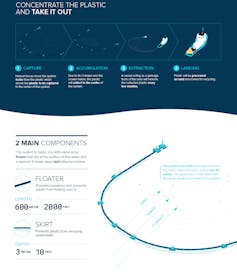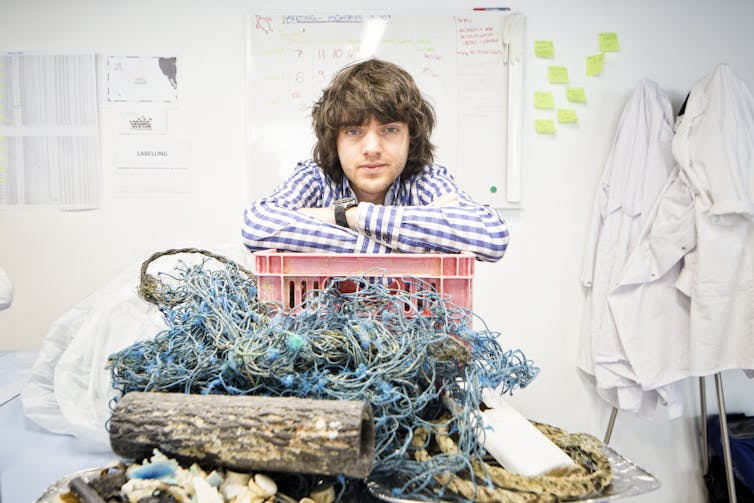How To Get Paid And Clean The Ocean
A novel "floating pipe" to recover plastic from the ocean has simply arrived on its maiden voyage to the Great Pacific Garbage Patch. Run by Dutch starting time-upwards Ocean Cleanup, the scheme involves a 600m-long floating pipe connected to a net, which herds plastic into place before it is gathered and taken to shore by specialist boats.
The question of why nosotros should bother to make clean up the oceans may seem obvious to you but, equally an economist who studies these things, I like to put a number on it. We tin can therefore say that plastic in the ocean has a direct financial touch through things such equally lost tourism, damaged ships or fewer fish to take hold of. Simply it also has a wider and harder to quantify economical touch on on lost marine life or reduced embankment and water quality.
These damages, estimated at US$ane.25 billion annually, imply that recovering marine plastics is worthwhile. Only my inquiry suggests that it might not be financially viable to exercise then.

This is partly because the make clean-up is and then expensive. Unsurprisingly, towing a massive boom out to the middle of the bounding main and so periodically transporting plastics to and from information technology is not cheap.
The Ocean Cleanup's own 2014 feasibility report suggested that, once a full armada of 100km of these floating barriers was deployed at a cost of United states of america$372.73m (currency converted past myself in August 2018), it would collect plastic at effectually The states$5.32 per kilogram.
This wouldn't be a problem if discarded plastic was more valuable. The scheme could even pay for itself. Simply the clean-up will remain unprofitable for the fourth dimension being because the market price for discarded plastic remains incredibly low. I looked at four possible options for recovered plastic:
1. Landfill: This is the easiest option although information technology leads to actual internet losses rather than whatever do good.
Revenue per kg: -$0.12
2. Incineration: Burning all waste matter generates electricity which is reportedly as much as lx% cleaner than a fossil fuel equivalent. However, this negates the possibility of recycling or reusing the plastics.
Revenue per kg: $0.10
3. Pyrolysis: Similar to incineration, except the plastic is heated in the absence of oxygen, then it doesn't burn. Instead, the process generates oils which tin be refined and sold. All the same, the viability of pyrolysis is dependent on economies of scale which may not accommodate information technology to the infrequent collection of marine plastics. Furthermore, at a depression level, it is unlikely that the generated oil from plastics can be toll competitive with conventional oil sources.
Acquirement per kg: $0.27
iv. Recycling: This is the preferred option, equally it is a more efficient use of existing resources. But volatile recycled plastic prices and depression virgin plastic prices suggest that this, too, is unlikely to be a profitable choice.
Revenue per kg: variable, but a weighted average of $0.15 is a reasonable assumption
All this ways it costs more $5 to gather a kilo of plastic from the body of water, while that same plastic will but be valued at – at best – 30 cents. With about 8 billion kilos (8,000 tonnes) of plastic added to the body of water each year, the costs – and losses – involved are huge.
Costs will decline in the long term
Of grade, such a massive loss is not likely to persist in the long term. For instance, increasing oil prices will push upwards the price of virgin plastics hence making recycling a more valuable option. Furthermore, the loftier cost expectations are primarily due to this being the offset system of its type. With farther experience, research and development in recovering debris at ocean, information technology is likely that a lower-price method will arise. Withal, there is no immediate indication of such improvements, and so big losses are expected to persist in the curt to medium term.
The financial loss contrasts with the economic benefits of recovering marine plastics. Even conservative underestimates of the costs of marine plastics suggest annual damages to be in the billions.

Using estimates of how much plastic is in the ocean, I was able to estimate that removing each kilogram would lead to a net benefit of at to the lowest degree U.s.$7 and every bit much as U.s.a.$38. But that nevertheless leaves us with a directly financial loss of most US$five per kilogram recovered, versus a more than than US$vii internet benefit to society for every kilogram recovered.
Unprofitable… but imperative
So we are at an impasse. It is nowhere about assisting to recover marine plastics, yet it is imperative to practice and so. Thankfully, a few solutions are at manus.
The first is crowdfunding. This avenue worked before for the scheme in question which managed to raise more than than $2m in but 100 days. But in that location are doubts about how viable such a fickle and inconsistent funding source is for a longer-running scheme that would operate at a global calibration.
Philanthropy is some other pick. Conceivably, with the back up of just a few wealthy benefactors, viable ocean clean-up could be a reality. Nonetheless, it is unclear whether leaving bounding main clean-up to the whim of a few individuals is a sustainable model in the longer term.
Finally, the international nature of plastic pollution suggests no single government is going to foot the neb – especially if all the financial benefits are privately appropriated. Withal, one suggestion is that if taxpayers are already paying ecology charges aimed at reducing plastic pollution, such every bit the plastic pocketbook tax or proposed latte levy, then maybe these revenues could be earmarked to fund the scheme.
So future policymakers must pay particular attention to the diverse mechanisms and agreements that may bridge the gap between financial losses and economical benefits. Indeed, evidence suggests a healthy caste of public support for cleaning upward the environment, simply whether the public feels strongly enough to back up efforts via crowdfunding or earmarked taxes remains to be seen.
Plastic causes $13 in damages per kilogram per yr. The race is on to determine how nosotros tin can clean upward the earth'southward oceans without bankrupting ourselves.
Source: https://theconversation.com/ocean-cleanup-wont-turn-a-profit-but-we-should-still-do-it-104097
Posted by: mccarterhable1977.blogspot.com


0 Response to "How To Get Paid And Clean The Ocean"
Post a Comment